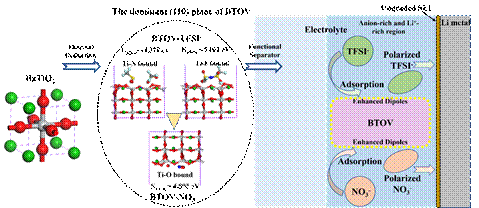1、Introduction
The Wide-Temperature-Range and High-Specific-Energy Solid-State Battery Research Team at Central South University is dedicated to addressing the critical needs of the nation, national defense, and industry. Focused on overcoming key technical challenges in the development and application of wide-temperature-range and high-specific-energy solid-state batteries, the team engages in collaborative research across production, education, research, and application domains. This includes work on high-specific-energy cathode materials, solid electrolytes, high-performance composite separators, and metal anodes. The team comprises three faculty members, including two full professors and one associate professor. Among them, one is a leading talent under the National "Ten Thousand Talents Program," and another is a recipient of the "Young Talent Support Project" from the China Association for Science and Technology. Currently, the team is responsible for over ten significant scientific research projects, including those funded by the National Key Research and Development Program, the Equipment Development Department/Military Science and Technology Commission/State Administration of Science, Technology and Industry for National Defense, and the National Natural Science Foundation of China. In recent years, the team has published more than 100 papers in prestigious academic journals such as Advanced Materials and Angewandte Chemie International Edition. Graduates from the team have pursued further studies at renowned universities like Peking University and Beihang University or joined leading enterprises such as Huawei and CATL. Additionally, the team's technological achievements have led to the establishment of high-tech companies, including Guangdong Jusheng Technology Co., Ltd.
2、Team Leader
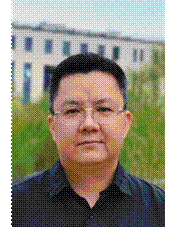
Wei Weifeng, Ph.D., Researcher, is a distinguished scholar recognized as a leading talent in scientific and technological innovation under the National "Ten Thousand Talents Program." He has also been honored with the Young Overseas High-level Talent Program by the Organization Department of the CPC Central Committee and designated as a "New Century Excellent Talent" by the Ministry of Education. Furthermore, he is a Fellow of the Royal Society of Chemistry (FRSC) and a Fellow of the International Association of Advanced Materials (IAAM). Dr. Wei has led over 10 significant scientific research projects, including those funded by the National Key Research and Development Program and the National Natural Science Foundation of China. He has authored more than 200 peer-reviewed academic papers published in prestigious journals such as Chem. Soc. Rev., Adv. Mater., and Adv. Funct. Mater., accumulating over 15,000 citations. Additionally, he holds more than 50 authorized invention patents, and his technology transfer achievements have reached a total value of 78.3 million yuan. His contributions to science and innovation have been acknowledged through numerous awards, including the First Prize for Technological Invention of the China Nonferrous Metals Industry Association (2022), the Second Prize (2023), the Second Prize for Natural Science of the Ministry of Education (2017), the Hunan Provincial Science and Technology Innovation Team Award (2020), and the China Industry-University-Research Cooperation Innovation Award (2023). From 2020 to 2023, he was consecutively awarded the title of Outstanding Provincial Innovation and Entrepreneurship Instructor for three consecutive years.
3、Members
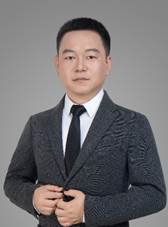
Zhou Liangjun, Ph.D., Researcher, and recipient of the Excellence Award from the President of the Chinese Academy of Sciences. His research focuses on new energy storage materials and devices, particularly wide-temperature-range lithium/sodium batteries and functionalized separators. Over the past five years, he has led four national-level projects, one project funded by the Changsha Natural Science Foundation, two self-funded projects from the State Key Laboratory, and one collaborative school-enterprise development project. In 2023, he was awarded the second prize of the China Nonferrous Metals Industry Science and Technology Award (ranked second). He has mentored undergraduate students in securing the Outstanding Innovation and Entrepreneurship Project at Central South University and receiving the "Excellent Paper Award" during the Central South University stop of "Innovative China." As the first or corresponding author, he has published 35 papers in prestigious journals such as Advanced Functional Materials and Acta Materialia, achieving an H-index of 37. He has filed 13 national invention patent applications, six of which have been granted. Additionally, he co-authored one monograph (ranked second). Dr. Zhou serves as a young editorial board member for several academic journals, including Rare Metals, Advanced Powder Materials, and the Journal of Central South University.

Zhang Chunxiao, Ph.D., Associate Researcher, currently serves as the Deputy Secretary-General of the Solid-State Battery Branch of the Hunan Battery Industry Association. Her research focuses on new energy materials and devices, with an emphasis on the design and development of key materials for high specific energy lithium/sodium batteries. She has led multiple scientific research projects, including grants from the National Natural Science Foundation of China, the China Postdoctoral Science Foundation, the Natural Science Foundation of Hunan Province, and several industry collaboration projects. To date, she has authored over 30 SCI-indexed papers in international peer-reviewed journals, including more than 20 as the first or corresponding author in top-tier journals such as *Advanced Materials*, *Acta Materialia*, *Advanced Energy Materials*, and *Advanced Functional Materials*. Additionally, she has filed over 20 national invention patents, seven of which have been granted. As a key contributor, she has participated in two technology transfer projects for her team's scientific achievements. Dr. Zhang also serves as a young editorial board member for prestigious international journals such as *Advanced Powder Materials* and *Battery Energy*. Her contributions have been recognized with numerous awards, including the Science and Technology Award of the China Nonferrous Metals Industry, the Outstanding Doctoral Dissertation Award of the Chinese Nonferrous Metals Society, and the title of Excellent College Student Communist Party Member of Hunan Province.
4、Main Research Field
(1)Solid-state battery materials and devices
In consideration of the safety risks, such as heat generation, ignition, and explosion, commonly associated with organic electrolytes, a novel concept of in-situ polymerization reaction for achieving interfacial confinement of organic electrolytes and an innovative method of anion-anchored functional grafting were proposed. A series of polymer materials with three-dimensional cross-linked network structures, including polyamide-based, polyimide-based, and polyether-based polymers, were systematically designed and synthesized. The capacity of high-voltage ternary lithium metal battery cells with capacities of 5 Ah, 20 Ah, and 40 Ah was progressively scaled up in an efficient and stable manner. The developed "composite electrolyte materials and solid-state battery technology" has successfully completed the transformation from research achievements to practical applications.
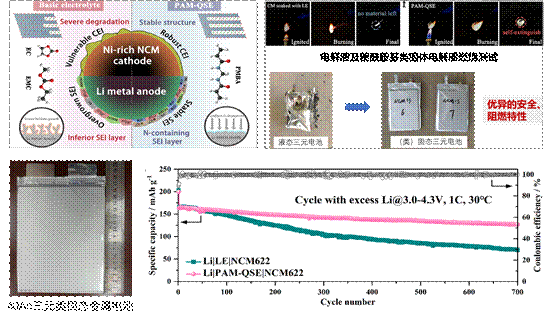
(2)Wide-temperature-range battery materials and devices
Aiming to address the challenges of poor low-temperature ionic diffusion kinetics, inadequate high-temperature stability, irreversible phase transformations at high voltages in cathode materials, as well as low ionic conductivity, slow desolvation at low temperatures, and extensive side reactions at high temperatures in electrolytes, strategies such as constructing coherent multiphase structures via internal stress adjustment, anion regulation, multi-element synergy, and competitive coordination are implemented. These approaches enhance the structural stability of cathode materials, optimize the solvation structure of electrolytes, and establish fast ion transport channels, thereby enabling the development of high-performance battery materials and devices operable across a wide temperature range from -60°C to 80°C.
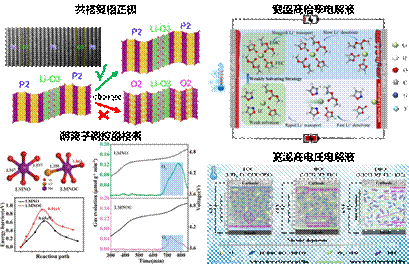
(3)High energy density battery materials and devices
Centered on the urgent demand for high energy density, systematic research has been conducted on cathode materials, metal anodes, and separators. This research is based on strategies such as the construction of complex-phase coherent structures, surface chemical activation, artificial interface engineering, and field-effect coupling. As a result, high interfacial stability has been achieved for high specific energy cathode materials, high stability for metal anodes, and high reliability for functionalized separators. Notably, lithium-rich manganese-based cathode materials have already undergone successful transformation and application of research outcomes.
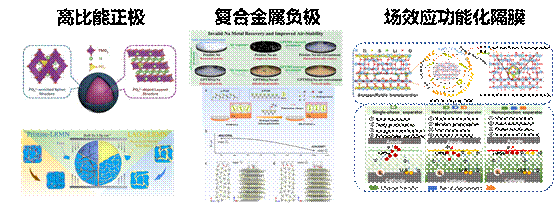
(4)Design and Application of Field Effect Interface Layer
Aiming to address the issues of poor interfacial stability and inadequate kinetic performance in batteries during wide-temperature cycling, a series of composite interfacial layers based on organic PVDF and inorganic relaxor ferroelectric BTO were systematically designed. By leveraging the built-in electric field generated by the ferroelectric interfacial layer, effective regulation of anion migration and decomposition was achieved, while lithium-ion migration was significantly enhanced. Consequently, the wide-temperature stability of the battery was successfully realized.
